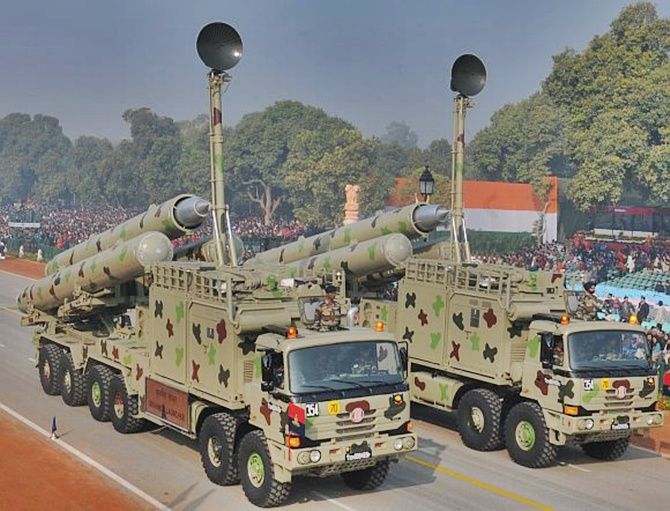
Indian firms have spurned some $15 billion worth of government tenders to make a range of weapons since 2013, defence ministry officials say, in a blow to Prime Minister Narendra Modi and his drive to wean the country off imported arms.
Executives cited unrealistic quality demands from a military short of planes, tanks and guns as a key reason for their reluctance to bid for projects.
Complicating things further, the military doesn't want weapons from Indian firms with no track record in defence manufacturing, experts said.
Irked by India's status as the world's biggest arms importer, Modi wants to build an advanced defence industry but almost a year into his "Make in India" campaign, which aims to turn the country into a manufacturing powerhouse, not one large domestic weapons project has been awarded.
Tenders for anything from air defence guns to surface-to-air missiles to transport planes have lapsed, defence ministry officials told Reuters.
The tenders total around $15 billion according to a Reuters compilation of offers since early 2013.
"'Make in India' is a laudable aim, but it's moving rather slowly. It's not a switch you can press and everything will fall into place," said Vivek Rae, head of procurement at the Defence Ministry from 2010-2012.
Anil Ambani, the billionaire chairman of the Reliance Group, recounted at a recent conference how Modi asked him if he knew India didn't make tear gas shells. "Even the tears we shed are foreign," Ambani quoted the nationalist leader, who took office last May, as saying.
Modi wants to build a strong military after years of neglect that military planners say has left India vulnerable should rivals China and Pakistan ever launch a combined attack, although experts say this is highly unlikely.
India is being challenged, however, in its Indian Ocean backyard, where China's more modernised navy is starting to assert itself. Defence Minister Manohar Parrikar has said new defence production policies will be unveiled this month to address the concerns of private firms: opaque procedures, unrealistic quality requirements and slow decision-making.
"We're trying to simplify procedures, create a level-playing field but still there are many cases of zero participation in tenders," said G. Mohan Kumar, the defence production secretary leading the localisation drive.
The military declined to comment, referring queries to the Defence Ministry, which controls procurement.
RINGFENCING PROJECTS
India gets 70 per cent of its arms from abroad. For decades, it has bought off-the-shelf equipment mainly from Russia, which offered to assemble some weaponry locally but little in the way of technology transfers.
Modi has vowed to change that by ringfencing $100 billion worth of defence deals for domestic companies over the next decade under which they can build on their own or with foreign partners.
Last year the government asked several Indian companies to show interest in an estimated $1.7 billion deal to replace 1960s-era Swedish air defence guns, but only one said it could meet the requirements, said one of the defence ministry officials. He declined to identify the company.
The head of one firm which told the government it was not interested in the project said the military laid down "impossible" requirements by insisting on technology that only foreign manufacturers had.
He declined to be identified because of the sensitivity of defence issues.
In November, the government put an estimated $2 billion proposal to replace its ageing fleet of Avro cargo planes on ice after the tender attracted only one bidder, a partnership between Europe's Airbus Group and India's Tata Sons.
"Even if there is an alternative better solution, as per current practice the requirements cannot be changed, or if they are changed it is questioned," said M.V. Kotwal, head of defence business at infrastructure group Larsen and Toubro. "The flexibility is not there."
Over the past 18 months, 41 requests for expressions of interest for naval projects alone fell through because of problems relating to manufacturing requirements, the defence ministry official added.
JUMPSTART
Trying to move projects along, Modi's government in February approved an $8 billion proposal to build warships in India that had been awaiting cabinet signoff since 2012.
It has also ordered an accelerated local programme to build six diesel-electric submarines, in addition to six similar vessels that French firm DCNS is assembling in Mumbai port to replace India's ageing underwater fleet.
A defence ministry committee submitted a report last month identifying five private and state-run shipyards where the submarines could be built with a foreign partner.
It will now invite expressions of interest for the $8.5 billion project. Experts said one problem is that some military officers eye technology only available in the west, without understanding what Indian firms can produce.
"The armed forces are reluctant to accept hardware that doesn't have a record in operational conditions. Indian companies have no track record," said Bharat Karnad at the Centre for Policy Research in New Delhi.
Retired vice admiral Premvir Das added that to expect Indian companies to manufacture major defence platforms in the forseeable future is to "live in a dreamland".
Photograph: Reuters











